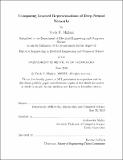Comparing learned representations of deep neural networks
Author(s)
Miglani, Vivek N.
Download1127911967-MIT.pdf (1013.Kb)
Other Contributors
Massachusetts Institute of Technology. Department of Electrical Engineering and Computer Science.
Advisor
Aleksander Ma̧dry.
Terms of use
Metadata
Show full item recordAbstract
In recent years, a variety of deep neural network architectures have obtained substantial accuracy improvements in tasks such as image classification, speech recognition, and machine translation, yet little is known about how different neural networks learn. To further understand this, we interpret the function of a deep neural network used for classification as converting inputs to a hidden representation in a high dimensional space and applying a linear classifier in this space. This work focuses on comparing these representations as well as the learned input features for different state-of-the-art convolutional neural network architectures. By focusing on the geometry of this representation, we find that different network architectures trained on the same task have hidden representations which are related by linear transformations. We find that retraining the same network architecture with a different initialization does not necessarily lead to more similar representation geometry for most architectures, but the ResNeXt architecture consistently learns similar features and hidden representation geometry. We also study connections to adversarial examples and observe that networks with more similar hidden representation geometries also exhibit higher rates of adversarial example transferability.
Description
This electronic version was submitted by the student author. The certified thesis is available in the Institute Archives and Special Collections. Thesis: M. Eng., Massachusetts Institute of Technology, Department of Electrical Engineering and Computer Science, 2019 Cataloged from student-submitted PDF version of thesis. Includes bibliographical references (pages 63-64).
Date issued
2019Department
Massachusetts Institute of Technology. Department of Electrical Engineering and Computer SciencePublisher
Massachusetts Institute of Technology
Keywords
Electrical Engineering and Computer Science.